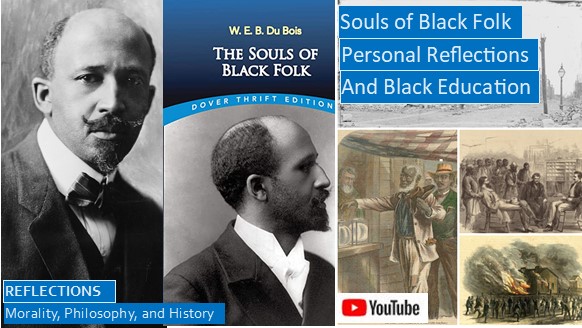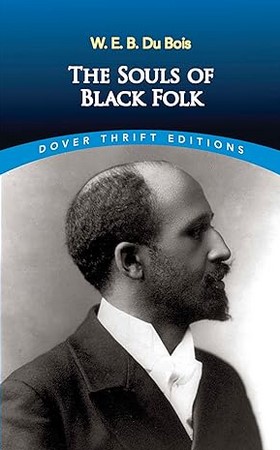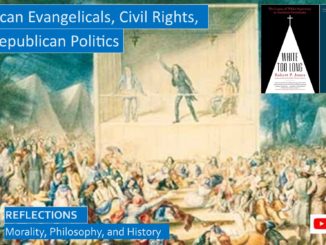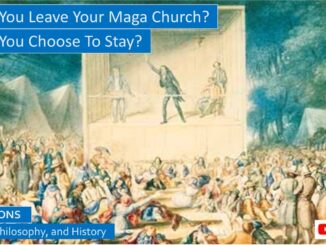
Should blacks compromise, or should blacks protest when facing discrimination and segregation? Should blacks compromise under the leadership of Booker T Washington, or should blacks protest under the leadership of WEB Dubois, who founded the NAACP? This question is a question each black person needs to answer for himself from the days of Jim Crow up to the present day.
Booker T Washington, born in 1856, was the last generation of black leaders who were born into slavery and emancipated during the Civil War, dying in 1915. After emancipation he learned to read and attended a black college, Howard University, and was selected as the first leader of Tuskegee Institute. After a year a neighboring plantation was purchased, and the students grew crops, raised livestock, and literally built the school. The purpose of the school was not only to produce farmers and tradesmen, but to also educate teachers of trade schools all across the South.[1] During these years the Ku Klux Klan ruled the night, terrorizing and lynching blacks at will, blacks had no legal recourse, they were helpless when their houses and churches and crops were put to the torch, there was no justice. Blacks could only mind their own business, accepting what little pay they could earn, avoiding attention, not becoming too prosperous.
Our YouTube video includes information not mentioned in this blog: https://youtu.be/x212gx1lNIA
WEB Dubois, born three decades later in 1868, was among the first generation of black leaders born under Reconstruction, dying at the dawn of the modern civil rights era in 1965. WEB Dubois also attended a black college, Fisk University, and later earned a PhD at Harvard, and became a professor at Atlanta University.[2]
Booker T. Washington’s most famous speech was at the 1895 Cotton States and International Exposition at Atlanta, Georgia. This speech led to the Atlanta Compromise between white and black leaders, which agreed that “Southern blacks would work and submit to white political rule, while Southern whites guaranteed that blacks would receive basic education and due process in law. Blacks would not focus their demands on equality, integration, or justice, and Northern whites would fund black educational charities.”[3] This likely led to Washington receiving more funds for his endeavors to uplift his black student, but had little effect on providing blacks with more due process since it did not address restoring black voting rights.
Washington’s famous speech starts,
“A ship lost at sea for many days suddenly sighted a friendly vessel. From the mast of the unfortunate vessel was seen a signal, “Water, water; we die of thirst!” The answer from the friendly vessel at once came back, “Cast down your bucket where you are.” A second time the signal, “Water, water, send us water!” ran up from the distressed vessel, and was answered, “Cast down your bucket where you are.” And a third and fourth signal for water was answered, “Cast down your bucket where you are.” The captain of the distressed vessel, at last heeding the injunction, cast down his bucket, and it came up full of fresh, sparkling water from the mouth of the Amazon River. To those of my race who depend on bettering their condition in a foreign land or who underestimate the importance of cultivating friendly relations with the southern white man, who is their next-door neighbor, I would say: ‘Cast down your bucket where you are; cast it down in making friends in every manly way of the people of all races by whom we are surrounded. Cast it down in agriculture, mechanics, in commerce, in domestic service, and in the professions. And in this connection it is well to bear in mind that whatever other sins the South may be called to bear, when it comes to business, pure and simple, it is in the South that the Negro is given a man’s chance in the commercial world.”
Later in the speech Washington reemphasizes that:
“No race can prosper until it learns that there is as much dignity in tilling a field as in writing a poem. It is at the bottom of life we must begin, and not at the top. Nor should we permit our grievances to overshadow our opportunities. It is important and right that all privileges of the law be ours, but it is vastly more important that we be prepared for the exercise of these privileges. The opportunity to earn a dollar in a factory just now is worth infinitely more than the opportunity to spend a dollar in an opera house.”[4]
For more on this era, please view the Yale Lectures on Reconstruction and Redemption Eras:
http://www.seekingvirtueandwisdom.com/post-civil-war-reconstruction-and-redemption-history-yale-lecture-notes/
At first WEB Dubois joined in with the Atlanta Compromise movement, but he became restive and impatient, publicly feuding with Booker T Washington, who asks black people, FOR THE PRESENT, to give up political power, their civil rights, and higher education for Negroes, and concentrate on the trades, accumulating wealth, and conciliating the South. What did the Negro receive in return? They lost their right to vote, the Jim Crow laws ground them down, and the Negro colleges were drained of their funding.
WEB Dubois tells us in his book, The Souls of Black Folk, that Mr. Washington career is a triple paradox:
“1. He is striving nobly to make Negro artisans businessmen and property-owners; but it is utterly impossible” for them to defend their rights and exist when they do not have the right to vote.
“2. He insists on thrift and self-respect, but at the same time counsels a silent submission to civic inferiority such as is bound to sap the manhood of any race in the long run.”
“3. He advocates common-school and industrial training, and depreciates institutions of higher learning; but neither the Negro common-schools, or Tuskegee itself, could remain open a day were it not for teachers trained in Negro colleges or their graduates.”
Is the Negro responsible for his plight? WEB Dubois criticizes Mr. Washington: “His doctrine allows whites, North and South, shift the burden of the Negro problem to the Negro’s shoulders . . . when in fact the burden belongs to the nation, and the hands of none of us are clean if we do not strive to right these great wrongs.”
What WEB Dubois does not tell us is Booker T Washington did not really mind his opposition. Booker T Washington continued to compromise his entire life so the donations would continue to flow from his white philanthropist friends, who were genuine friends seeking to help the black cause in a safe but genuine manner. Some of these funds were secretly diverted to WEB Dubois to help fund the agitation of the NAACP. The next generation of black leaders would not need to be as compromising.
SOULS OF BLACK FOLK ESSAY, ON SPIRITUAL STRIVINGS
WEB Dubois was raised in Massachusetts and never suffered mildly racist attitudes until he attended public school. He innocently gave a valentine to a white girl and the shocked response really astounded him. He first encountered the virulent racism of the Deep South when he attended the black Fisk University in Tennessee and the Jim Crows system of suppression of black voting, bigotry, and lynchings, which peaks in the years of his schooling. WEB Dubois, why does being black mean being a problem to solve?
The crime of slavery in the Deep South is the slave was not considered a real person deserving dignity but was more like talking livestock that could be shamelessly broken by the lash. Slaves were forbidden to marry, often forced to breed like horses, and often slave women were raped by their masters. These attitudes persisted stubbornly, and WEB Dubois in his writings exhorts to respect the dignity of blacks, how blacks should not be emasculated, how blacks should not be humiliated but be treated as the equal of blacks. This can be seen in this quote from the first essay, Of Our Spiritual Strivings:
“The Negro felt the weight of his ignorance, not simply of letters, but of life, of business, of the humanities; the accumulated sloth and shirking and awkwardness of decades and centuries shackled his hands and feet. Nor was his burden all poverty and ignorance. The red stain of bastardy, which two centuries of systematic legal defilement of Negro women had stamped upon his race, meant not only the loss of ancient African chastity, but also the hereditary weight of a mass of corruption from white adulterers.”[5]
WEB Dubois coined the term double-consciousness that has been used by American sociologists ever since. “It is a peculiar sensation, this double-consciousness (of blacks), this sense of always looking at one’s self through the eyes of others, this sense of always looking at one’s self through the eyes of others, of measuring one’s soul by the tape of a world that looks on in amused contempt and pity. One ever feels his two-ness, one American, another a Negro, two souls, two thoughts, two unreconciled strivings; two warring ideals in one dark body, who dogged strength alone keeps it from being torn asunder.”[6]
In his essay on the Dawn of Freedom he covers the struggles of emancipated slaves from the Civil War and Reconstruction eras, struggles that he covered in much detail in his book, Black Reconstruction. Enjoy our blog on this book:
http://www.seekingvirtueandwisdom.com/refuting-the-lost-cause-black-reconstruction-by-web-dubois/
WEB DUBOIS AND HIS FIRST TEACHING JOB
When he graduated from Fisk University he worked two years at a small schoolhouse earning a pittance for his pay. He could not afford a horse, so after he graduated he started walking through village after village asking if they needed teacher, and kept getting the answer, We don’t need a teacher here. Then he came to a ramshackle house where a black girl named Josie Dowell excitedly told him the village was looking for a teacher for a new school. He visited the commissioner’s house, showing his teaching certificate, and not only was he hired on the spot, he was sort-of invited to dinner. The whites ate first, then he was served, he ate alone.
WEB Dubois describes his one-room schoolhouse:
“The schoolhouse was a log hut, where Colonel Wheeler used to shelter his corn. It sat in a lot behind a rail fence where a door once was, and within, a massive rickety fireplace; great chinks between the logs served as windows. Furniture was scarce. A pale blackboard crouched in the corner. My desk was made of three boards, reinforced at critical points, and my chair, borrowed from the landlady, had to be returned each night. Seats for the children, these puzzled me much. I was haunted by a New England version of neat little desks and chairs, but alas! he reality was rough plank benches without backs, and at times without legs. The had the one virtue of making naps dangerous, possibly fatal, for the floor was not to be trusted.”
He taught there for two summers, but many students were not able to attend regularly, they had to help out with the harvest or at home. He liked to stay at the Dowell’s house, “and sit on the porch, eating peaches, while the mother bustled and talked: how Josie had bought the sewing-machine; how Josie worked at service in the winter, but that four dollars a month was ‘mighty little’ wages; how Josie longed to go away to school, but that it ‘looked like’ they never could get far enough ahead to let her; how the crops failed and the well was yet unfinished; and finally, how ‘mean’ some of the white folks were.”
Ten years later he visited the Dowells when he traveled to Fisk. The family had gone through many troubles in that decade. One of the sons was accused of stealing wheat from Farmer Durham and was thrown in jail, so he and another son fled the county. They could no longer work their tiny farm, they built a house in town, Josie worked in Nashville to help furnish the house. WEB Dubois tells us, “Josie shivered and worked on, with the vision of schooldays all fled, with a face wan and tired, worked until, on a summer’s day, some one married another; then Josie crept to her mother like a hurt child, and slept, and sleeps still.”
WEB Dubois also includes many essays on black colleges and educations, on life on the plantations employing black laborers, on how sharecroppers fall into cruel debt-bondage, on ramshackle shacks and black churches and spirituals and many other topics. One essay tells how the first born son of a black freedman died because the white doctors of Atlanta refused to treat black patients. These essays are summarized at:
https://en.wikipedia.org/wiki/The_Souls_of_Black_Folk
[1] https://en.wikipedia.org/wiki/Booker_T._Washington
[2] https://en.wikipedia.org/wiki/W._E._B._Du_Bois
[3] https://en.wikipedia.org/wiki/Atlanta_compromise
[4] Jonathon Holloway, Yale African American History: Emancipation to the Present, Lecture 6
[5] WEB Dubois, The Souls of Black Folk (New York: Dover publications, 1903, 1994), p. 5.
[6] WEB Dubois, The Souls of Black Folk, p. 2, https://en.wikipedia.org/wiki/Double_consciousness





5 Trackbacks / Pingbacks